Russia To Build Its Own Version Of France's Mistral Helicopter Landing Ships After Months Of Uncertainty

Russia has committed to building its own helicopter landing ships to replace the two Mistral vessels that France built but then declined to deliver to the Kremlin because of Russian actions in Crimea and East Ukraine, reported TASS, a Kremlin-owned Russian news site, Wednesday. Admiral Viktor Chirkov, who broke the news at the international maritime Defense show in St Petersburg, said that the new ships would be better than the Mistrals and expects them to be delivered in 2020.
"We are capable of building our own vessels and we know how to do that," said Chirkov. "Our industry does not stop, science is making progress."
While Russia and France have previously said the $1.5 billion contract for the two ships would not be fulfilled, Moscow's decision to build its own version will now end any lingering hopes from Paris that it could still offload the Vladivostok and the Sevastopol to the Russian navy and relieve itself of the supposed huge legal bill for non-delivery and the hassle of finding a new buyer.
Although neither ship was part of Western-led sanctions against Russia for its annexation of Crimea in March 2014 and its continued involvement in the 15-month East Ukraine war, French president Francois Hollande's government was put under severe pressure by other E.U. leaders not to complete the deal.
This left Paris and its contractors in breach of contract, a failure that may now see Moscow collect its original deposit and many billions on top of the value of the ships, according to legal experts.
Hollande had attempted to negotiate a way to facilitate the delivery, saying that if Moscow and the rebels it backs in Donbas, Ukraine met some of the conditions of February's Minsk II agreement, it would hand the ships over. But as the war progressed and peace became ever evasive, the French were forced to keep both ships, which remain in the French port of Saint Nazaire in western France.
Russian navy sources say the design for the new ship is ready, and when complete will be able to accommodate 16 helicopters, 450 troops and 80 equipment units.
© Copyright IBTimes 2024. All rights reserved.












